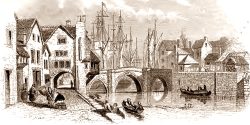Notes from the 2 July 1832 edition:
Letters to the electors of Bridgwater and the wider district from William Astell (of ‘Portland Place’ – presumably London rather than Wembdon – a portrait can be seen here), B. Escott, J. Founes Luttrell and C.J. Kemeys Tynte.
An auction to be held in Bridgwater for three properties in St Mary Street:
- Lot 1: The Crown Inn, with extensive underground cellars, the Inn being a mail coach stop. This is 40 St Mary Street: in 1893 the name was changed to Alexandra and it later became the Comrade’s Club.
- Lot 2: Site a the lane which once led to the George Inn with coach house and stables, near lot 1.
- Lot 3: A dwelling house and Inn in St Mary Street called the Old Cheese House. The Cheese House was on the west side of St Mary Street, with Friarn Street on the north. It was referred to as the ‘old’ Cheese House to distinguish it from the Cheese House Market, which was in the middle of St Mary Street.

Another auction for the goods of Reverend John Brice to be held at Aisholt.
Mention of Globe Insurance Bridgwater Agent J.R.Poole, also Promoter Life Insurance and Annuity Company Bridgwater agent James Pyke.
Another advert for the Session Ball. Sir Alexander Hood and Captain Luttrell the stewards.
A sermon is to be held by Rev Samuel Starkey to raise funds for the Bridgwater Infirmary.
Advert for ‘Fancy Summer Goods’ at Clark’s London House on the Cornhill.
Editorial about the Whigs sending William Tayleur to Bridgwater. There’s criticism of the situation as Tayleur is known for anti-slavery speeches, while his superior in the party, who sent him to Bridgwater, Mr Shirley, is a slave owner. The editorial doesn’t criticise slavery in itself, but the apparent hypocrisy of the situation.
Fire at the property of John Biffen of Charlinch.
